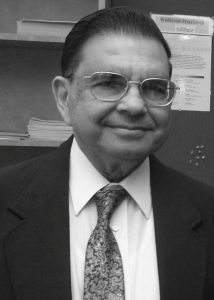
Augusta University will celebrate the legacy of one of its most illustrious educators and researchers at the inaugural President’s Research Symposium for Institutional History on Tuesday, April 26.
The symposium will begin at Lee Auditorium at 9 a.m. and will run until 4:30 p.m.
Dr. Virendra B. Mahesh, professor and chair emeritus of the former Department of Endocrinology at the Medical College of Georgia, will be honored during the all-day ceremony for his contributions to the field of endocrinology research and his dedication to the art of teaching.
This event is free and open to all Augusta University faculty, staff, students and alumni. Lunch will be available for attendees who pre-registered.
Dr. Virendra B. Mahesh: A Legacy of Excellence
In the words of Dr. Darrell Brann, vice chair of the Department of Neuroscience and Regenerative Medicine at the Medical College of Georgia, “For some people, greatness comes early and never departs.”
That was certainly true of his former mentor. By age 34, Mahesh had already earned two doctoral degrees—a PhD in Chemistry from the University of Delhi and a DPhil in Physiology from Oxford—and completed a post-doctoral fellowship at Yale. Shortly after, he established his laboratory with National Institutes of Health support at the Medical College of Georgia and instituted one of the nation’s first PhD programs in Endocrinology. There, he would serve for more than 40 years before retiring with honor. The rest, as they say, is history.
The most remarkable quality about Mahesh isn’t how quickly he attained success, however. Nor was it his ability to maintain it. What set Mahesh apart both as a professor and a researcher, according to his former students, was the way he imparted his successful tendencies to others.
Dr. John Black, president emeritus of East Georgia College and a former professor of biology at Augusta University, was one of Mahesh’s first graduate students. He said he remembers his mentor as a truly singular figure—someone for whom his respect has only grown over the years.
“I think I realized it immediately when I met him,” Black said. “The first time I met him, I thought to myself, this is someone really special.”
Special, perhaps, is an understatement. To understand why, though, you must first understand the man himself.
Mahesh was — and is — a quiet individual. A consummate scientist, he has a subtle sense of humor and is well-respected by colleagues and former students alike for his ability to instruct without criticizing. One of his most notable qualities, however, is his unique ability to take something and make the very best of it. It was a talent he would ply time and again in both the lab and the classroom, Black recalled.
“The first abstract I ever wrote for him, I worked on it until I thought it was great,” Black said. “Dr. Mahesh made me think it was great, too, but he took my words and drew circles around them and put them somewhere else entirely. By the time he’d gotten through with it, my abstract looked like a roadmap.”
But in editing Black’s abstract, Mahesh had not remade his student’s message. Instead, he’d taken Black’s ideas — his own words, in many instances — and rearranged them to form a more coherent thought.
“He had a mind that clearly saw concepts,” Black explained. “An analytical mind and an ability to explain things in a way that students could understand. That was Dr. Mahesh.”[mks_pullquote align=”left” width=”300″ size=”24″ bg_color=”#ffffff” txt_color=”#0e314b”]”He had a mind that clearly saw concepts. An analytical mind and an ability to explain things in a way that students could understand. That was Dr. Mahesh.”[/mks_pullquote]
But his continual desire to help others improve was only part of what made Mahesh an exceptional teacher. Another aspect, Brann said, was the faith he placed in his students.
“Of the more than 400 original research manuscripts he’s published since 1955, nearly half have been from graduate research,” he said. “This world-class scientist was willing to invest his considerable talents in a continual series of graduate student experiments. It was classic paternal mentoring.”
In a sense, then, what made Mahesh a great researcher and an exceptional professor was the fact that he was never just one or the other. He strived to be both, eternally, and in so doing, he became something more.
“He was the ultimate leader,” Black said.
That leadership wasn’t something Mahesh claimed, however. It developed, as Brann explained, simply from being.
“Quite simply, the formula for Dr. Mahesh’s success, in life and as a professor, was the constant pursuit of excellence with integrity,” Brann said. “Virendra welcomed us all and tolerated our stumbling without letting us fall as we absorbed his model. He never had to explain it: we simply saw what he did and aspired to the same.”
Time has proven that his model was clearly a brilliant one.
Over the years, Mahesh and the Department of Endocrinology produced a disproportionate number of Augusta University’s distinguished alumni. Today, their numbers include professors, directors, laboratory chiefs, department chairs as well as current and former university presidents. Black, the program’s second graduate, is among them. As is Brann.
But the program, and Mahesh’s teaching, produced one other distinguished alumnus — a graduate whose impact on the university’s future has recently been felt by the entire Augusta community.
“Education is a two-way street, and Dr. Mahesh understood that,” said Dr. Brooks Keel, president of Augusta University. “Over the years, his guidance, patience and incredible mind have produced not only a wealth of outstanding research, but also a legacy of success in his former students. We thank him for that and for everything he’s done for our university.”
That Mahesh’s example touched so many speaks volumes to his character as a professor and as a researcher. Even in retirement, though, he remains a scientist and a leader.
To celebrate his storied career, then, his former pupils won’t dwell on his success alone. Instead, they’ll share with him what he cares about most: their own continuing research and their own continued success. After all, that’s the true mark of a leader — the triumphs of those who follow.
“Our careers are his real achievement,” Brann explained. “And he wouldn’t have it any other way.”
 Augusta University
Augusta University





